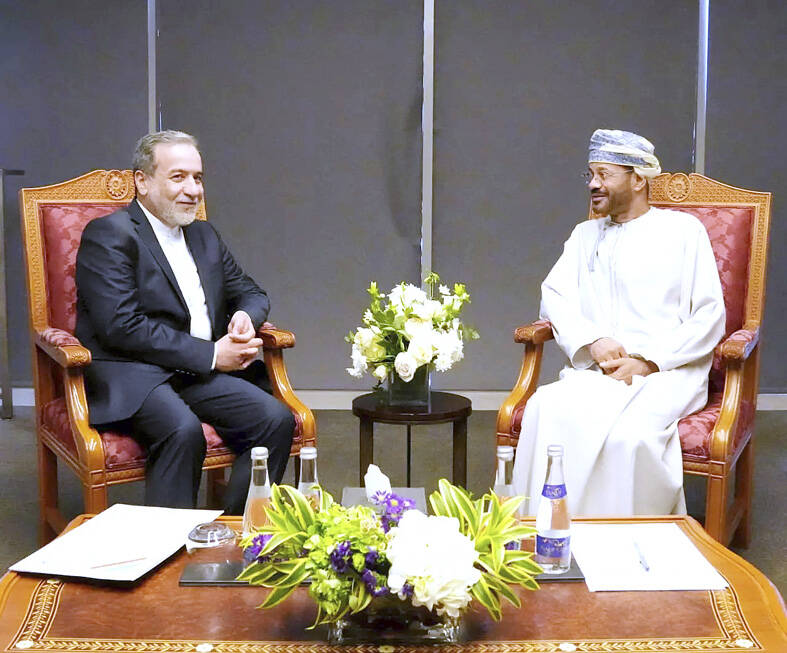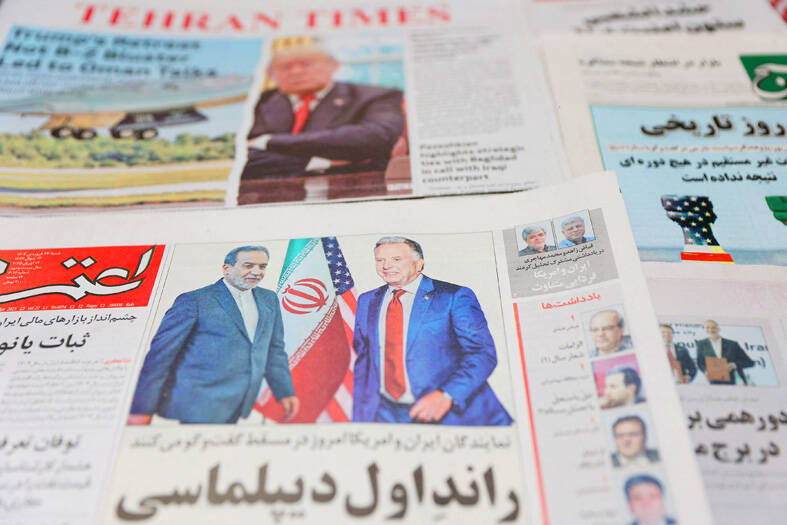The US and Iran were to begin high-stakes talks on Tehran’s nuclear program yesterday, with US President Donald Trump threatening military action should they fail to produce a new deal.
They would be the highest-level discussions between the foes since an international agreement on Iran’s nuclear program crumbled with Trump pulling out in 2018 during his first term in office.
Trump’s special envoy Steve Witkoff and Iranian Minister of Foreign Affairs Abbas Araghchi were to lead the discussions behind closed doors in Muscat, the capital of Oman, which has long played a mediating role between Iran and Western countries.

Photo: AP
Iran’s official IRNA news agency yesterday morning said that the delegation headed by Araghchi had departed Tehran for Muscat.
“I want Iran to be a wonderful, great, happy country, but they can’t have a nuclear weapon,” Trump told reporters aboard Air Force One, hours before the talks were due to begin.
He had made a surprise announcement on Monday that the talks would occur.

Photo: Reuters
Iranian supreme leader Ayatollah Ali Khamenei’s adviser Ali Shamkhani said Tehran was “seeking a real and fair agreement,” adding that “important and implementable proposals are ready.”
If Washington showed goodwill, the path forward would be “smooth,” he said on social media platform X.
The format for the talks has not been confirmed, with the US calling them direct talks, but Iran insisting on an intermediary.
The delegations would start indirect negotiations after a meeting with Omani Minister of Foreign Affairs Badr bin Hamad al-Busaidi, Iranian news agency Tasnim said.
The talks were expected to begin in the afternoon with Busaidi acting as an intermediary, Tasnim added.
Trump announced the talks during a White House press appearance with Israeli Prime Minister Benjamin Netanyahu, Iran’s arch-foe.
The contact between the two sides, who have not had diplomatic relations for decades, follows repeated threats of military action by the US and Israel.
Asked what would happen if the talks fail to produce a deal, Trump said: “If it requires military, we’re going to have military.”
SANCTIONS
Responding to Trump’s threat, Tehran said it could expel UN nuclear inspectors, a move that Washington warned would be an “escalation.”
Iran, weighed down by years of sanctions and weakened by Israel’s pummeling of its allies Hezbollah in Lebanon and Hamas in Gaza, has strong incentives to negotiate.
The US wants to stop Iran from ever getting close to developing a nuclear bomb.
The 2015 deal that Trump withdrew from aimed to render it practically impossible for Iran to build an atomic bomb, while at the same time allowing it to pursue a civil nuclear program.
The UK, China, France, Russia and Germany were the other parties to the agreement, of which Araghchi was a key architect.
Witkoff told the Wall Street Journal that “our position today” starts with demanding that Iran completely dismantle its nuclear program — a view held by hardliners around Trump that few expect Iran would ever accept.
“That doesn’t mean, by the way, that at the margin we’re not going to find other ways to find compromise between the two countries,” Witkoff told the newspaper.
“Where our red line will be, there can’t be weaponization of your nuclear capability,” he said.
NUCLEAR PROGRAM
Iran, which insists its nuclear program is for civilian purposes only, stepped up its activities after Trump abandoned the 2015 agreement.
The latest International Atomic Energy Agency report cited “serious concern” that Iran had an estimated 274.8kg of uranium enriched to 60 percent, nearing the weapons grade of 90 percent.
Ali Vaez, an Iran specialist at the Crisis Group, a US-based think tank, said agreeing on the scope of the talks would be “one of the first and most consequential issues.”
“Iran does not want an expanded agenda in the early stages, but no deal will be sustainable unless it becomes more comprehensive,” he said.
Iran is “likely to engage on steps to roll back its nuclear program, but not dismantle it entirely” in exchange for sanctions relief, Vaez added.
REGIME SURVIVAL
Karim Bitar, a Middle East Studies lecturer at Sciences Po University in Paris, said negotiations “will not focus exclusively on... the nuclear program.”
“The deal would have to include Iran stopping its support to its regional allies,” a long-standing demand by US allies in the Gulf, he said.
For Iran, it could be a matter of the government’s very survival.
“The one and only priority is the survival of the regime, and ideally, to get some oxygen, some sanctions relief, to get their economy going again, because the regime has become quite unpopular,” Bitar said.

‘EYE FOR AN EYE’: Two of the men were shot by a male relative of the victims, whose families turned down the opportunity to offer them amnesty, the Supreme Court said Four men were yesterday publicly executed in Afghanistan, the Supreme Court said, the highest number of executions to be carried out in one day since the Taliban’s return to power. The executions in three separate provinces brought to 10 the number of men publicly put to death since 2021, according to an Agence France-Presse tally. Public executions were common during the Taliban’s first rule from 1996 to 2001, with most of them carried out publicly in sports stadiums. Two men were shot around six or seven times by a male relative of the victims in front of spectators in Qala-i-Naw, the center

Australia’s opposition party yesterday withdrew election promises to prevent public servants from working from home and to slash more than one in five federal public-sector jobs. Opposition leader Peter Dutton announced his conservative Liberal Party had dropped its pledge that public servants would be required to work in their offices five days a week except in exceptional circumstances. “I think we made a mistake in relation to this policy,” Dutton told Nine Network television. “I think it’s important that we say that and recognize it, and our intention was to make sure that where taxpayers are working hard and their money is

Canadian Prime Minister Mark Carney is leaning into his banking background as his country fights a trade war with the US, but his financial ties have also made him a target for conspiracy theories. Incorporating tropes familiar to followers of the far-right QAnon movement, conspiratorial social media posts about the Liberal leader have surged ahead of the country’s April 28 election. Posts range from false claims he recited a “satanic chant” at a campaign event to artificial intelligence (AI)-generated images of him in a pool with convicted sex offender Jeffrey Epstein. “He’s the ideal person to be targeted here, for sure, due to

DISPUTE: Beijing seeks global support against Trump’s tariffs, but many governments remain hesitant to align, including India, ASEAN countries and Australia China is reaching out to other nations as the US layers on more tariffs, in what appears to be an attempt by Beijing to form a united front to compel Washington to retreat. Days into the effort, it is meeting only partial success from countries unwilling to ally with the main target of US President Donald Trump’s trade war. Facing the cratering of global markets, Trump on Wednesday backed off his tariffs on most nations for 90 days, saying countries were lining up to negotiate more favorable conditions. China has refused to seek talks, saying the US was insincere and that it